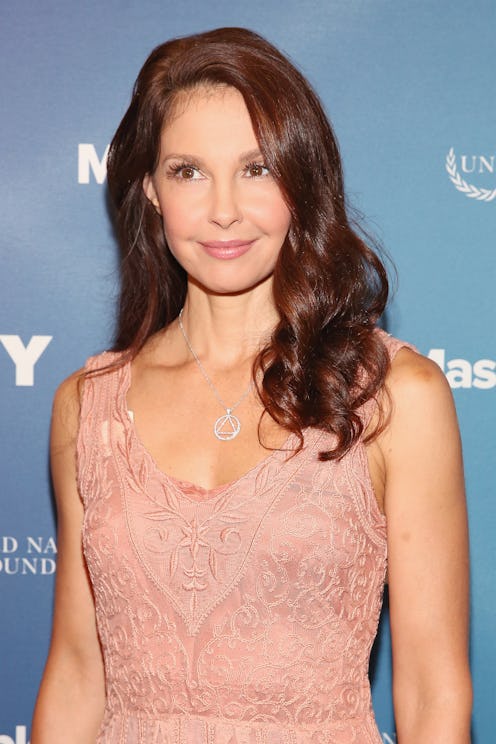It's no secret that Hollywood is a male-dominated industry, but many women in the entertainment industry are trying change that by taking a stand against gender inequality, among other important issues, and letting their voices be heard. Another unfortunate and disgusting product of Hollywood that too many women have faced and continue to experience is sexual harassment and/or sexual assault. For example, Ashley Judd claims she was sexually assaulted by a studio boss in the late '90s while filming the 1997 Paramount movie Kiss the Girls. It's something she only recently opened up about as part of Variety's Women of Power issue. She said:
I was sexually harassed by one of our industry’s most famous, admired-slash-rivaled bosses. I was making Kiss the Girls at the time, and here I was, a declared feminist. I had completed a minor in what was then called women’s studies, which we now call gender studies. And yet I did not recognize at the time what was happening to me. It took years before I could evaluate that incident and realize that there was something incredibly wrong and illegal about it.
According to Judd's claims, the unnamed studio exec repeatedly invited her to his hotel. She said, "He was very stealth and expert about it. He groomed me, which is a technical term — 'Oh, come meet at the hotel for something to eat.' Fine, I show up. 'Oh, he’s actually in his room.' I’m like, 'Are you kidding me? I just worked all night. I’m just going to order cereal.' It went on in these stages. It was so disgusting. He physically lured me by saying, 'Oh, help me pick out what I’m going to wear.'" She also claims that he asked her, "Will you watch me take a shower?" Judd claims that she repeatedly told him "no" to several of his alleged requests.
As the 47-year-old actress pointed out in her interview, she could've easily left the room, but as she explained, "When I kept saying no to everything, there was a huge asymmetry of power and control in that room." She later added, "Part of the strategy that keeps girls and women constrained in their professional experiences is retaliation and ridicule." It's important to remember, as she noted, to not take part in "victim-blaming." In fact, in the interest of helping other alleged victims, Judd says she sat down with other actresses who claim to have experienced similar harrassments at the hands of the same studio boss.
Eventually, the Insurgent actress stood up to her alleged harasser and said the following after he allegedly asked her to watch him take a shower:
I told him something like, "When I win an Academy Award in one of your movies." He said, “No, when you get nominated." I said, "No, no, when I win an Academy Award." That was a small moment of power when I was able to contradict him and hold to my reality. And then I got out of there. And by the way, I’ve never been offered a movie by that studio. Ever.
Sadly, this is something that happens way too often — and not just in Hollywood. Per the U.S. Equal Employment Opportunity Commission, sexual harassment is defined as:
Unwelcome sexual advances, requests for sexual favors, and other verbal or physical conduct of a sexual nature constitute sexual harassment when this conduct explicitly or implicitly affects an individual's employment, unreasonably interferes with an individual's work performance, or creates an intimidating, hostile, or offensive work environment.
In February 2015, it was revealed by a survey conducted by Cosmopolitan that one in three women has been sexually harassed at work. That's a disheartening number, to say the least, and proves that harassment happens way too often to women. As for those in Hollywood, Judd isn't alone. For example, Jewel wrote that she'd been sexually harassed since the age of 8 in her memoir, Never Broken: Songs Are Only Half the Story. If that isn't enough, of course, there are also the 50-plus women who have accused comedian Bill Cosby of sexual assault.
Hopefully, sooner rather than later, the above statistic will change. People like Judd are shining an important light on an extremely important issue that needs action, now. She bravely opened up and let her voice be heard. As she said, "We’re individually and collectively coming to a realization and acceptance that this is an entrenched part of the reality, and I think that talking about it is essential to the process of becoming aware, accepting that this is reality and then ultimately taking action."
With that, I'll end with this quote from Judd: "We’re all part of the problem, but we’re all part of the solution."
